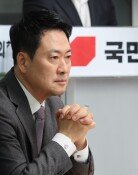Japan PM: Seoul, Tokyo Mulled Joint Security Declaration
Japan PM: Seoul, Tokyo Mulled Joint Security Declaration
Posted January. 09, 2010 07:02,
Japanese Prime Minister Yukio Hatoyama yesterday said South Korea and Japan are considering a joint security declaration in the first half of this year, the centennial anniversary of Japanese annexation of the Korean Peninsula.
The South Korean government denied this, however.
On media reports about the declaration, Hatoyama said, Bilateral relations between the two countries have seen problems. But recently, the emotional conflict between both sides has eased, which, in turn, has boosted the desire for bilateral cooperation. Such a mood has encouraged the two governments to discuss a joint declaration, something which I will consider.
Japans Defense Minister Toshimi Kitazawa said, The Korean Peninsula is a very important region. If possible, Japan should welcome a joint declaration with South Korea.
He then urged caution, saying, Ive not been told that Tokyo has considered a joint declaration.
An official from the Japanese Foreign Ministry also denied it, saying, Its not true that the Japanese government has mulled concluding a joint declaration on security with South Korea.
The leading Japanese daily Yomiuri Shimbun, however, yesterday said the leaders of the two nations considered the declaration. A Japanese government source was quoted as saying, The joint security declaration of the two governments will include measures to prepare against North Koreas development of nuclear weapons and missiles and strengthen international contributions to prevent global terrorism and piracy.
Media reports said that if adopted, the declaration would be announced in the first half of this year, when President Lee Myung-bak is expected to visit Japan.
Seoul denied the reports, saying, We have not considered any details.
A high-ranking official at the presidential office of Cheong Wa Dae said, This is just Japans desire. The two nations can cooperate in U.N. peacekeeping operations but must conclude several rounds of negotiations to announce a joint declaration. We have never officially discussed the issue.
The official also said President Lee has yet to even decide whether to visit Japan before July.
A source from the Foreign Ministry in Seoul said, Japan has long wanted to strengthen security cooperation with South Korea. But its hope is different from the actual possibility. 2010 is especially not a good year for the joint declaration. Even if our government announces a joint declaration, it should consider public sentiment. Hatoyama also seemed to make a theoretical response to journalists questions.
The reactions of the two governments to the supposed security declaration seem to stem from differing attitudes toward the 100th anniversary of Japans annexation of Korea.
South Korea, as the former victim, is seen as taking a cautious approach and gauging public opinion. Japan, as the former aggressor, apparently wants to take advantage of the joint declaration as a chance to rectify its past atrocities.
jkmas@donga.com yongari@donga.com




![“잠만 자면 입이 바싹바싹”…잠들기 전에 이것 체크해야 [알쓸톡]](https://dimg.donga.com/c/138/175/90/1/wps/NEWS/IMAGE/2026/02/23/133404749.3.jpg)


